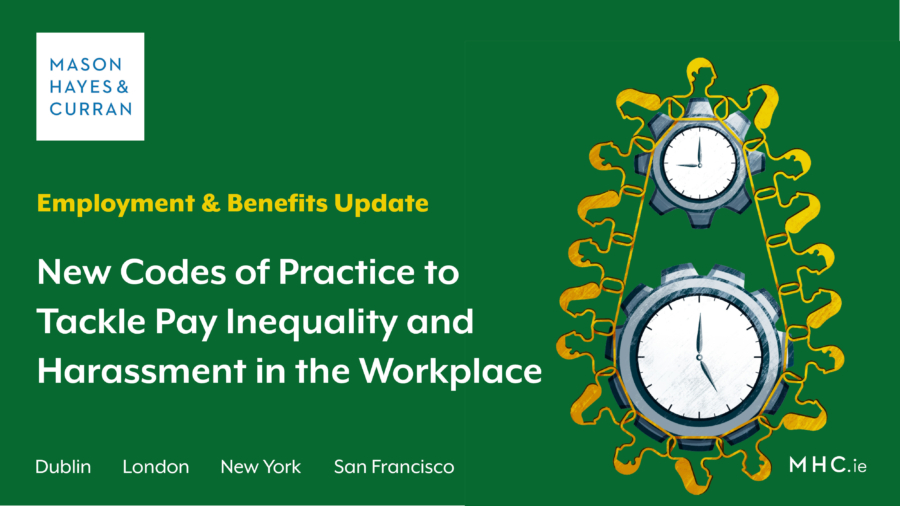New Codes of Practice to Tackle Pay Inequality and Harassment in the Workplace

In March 2022, to mark International Women’s Day, the Irish Human Rights and Equality Commission published new codes of practice on (1) Equal Pay; and (2) Sexual Harassment and Harassment at Work.
These two new codes of practice aim to give practical guidance to employers and employees on:
- the right to equal pay, the elimination of pay inequality, and the resolution of pay disputes, and
- what is meant by employment-related sexual harassment and harassment, how it can be prevented, and what steps ensure that adequate procedures are readily available to deal with the problem and to prevent its recurrence
While the codes do not impose any legal obligations themselves, employers should know that they are admissible in evidence in proceedings before the Workplace Relations Commission (WRC) and the Labour Court (LC), and in proceedings before the Circuit Court under Part VII of the Employment Equality Acts 1998 – 2015 (EEA).
Protected grounds
Both codes of practice outline that the EEA prohibit discrimination on nine specific grounds:
- Gender
- Civil status
- Family status
- Sexual orientation
- Religion
- Age
- Disability
- Race, and
- Membership of the Traveller community
Right to Equal Pay
The publication of the Code of Practice on Equal Pay (COP on Equal Pay) coincided with the announcement of the details of the gender pay gap reporting regulations that will shortly be published by the Minister for Children, Equality, Disability, Integration and Youth, as required under the Gender Pay Gap Information Act 2021. The regulations will require organisations with over 250 employees to report on their gender pay gap in December 2022. This requirement will extend over time to organisations with 50 or more employees.
The COP on Equal Pay reminds employers that the right to equal pay for like work is the right of an individual:
- Whose employment is covered under the EEA
- Who is performing work of the same or similar value to that of another individual employed by the same/an associated employer, and
- Who is covered by one of the nine protected grounds,
to receive the equal remuneration, which includes pay, allowances, bonuses, performance payments and non-cash benefits such as cars, and not to be paid less based on any of the nine protected grounds.
While employers are not required by law to carry out a pay review, the COP on Equal Pay recommends the carrying out of an organisational pay review, incorporating a rational and objective job evaluation model, as the most effective way of achieving pay equality, and sets out suggestions for what should be included in a pay review process.
Following an organisation’s pay review, or a successful equal pay claim, the COP on Equal Pay recommends that employers put in place a monitoring system to ensure regular pay reviews, as well as highlighting the availability of the grievance procedure to employees who have pay concerns or complaints.
Harassment and sexual harassment
The Code of Practice on Sexual Harassment and Harassment at Work (COP on Harassment) reminds employers of, amongst other things, the meaning and elements of harassment and sexual harassment and the employer’s defence of “reasonably practicable steps”.
The COP on Harassment recommends several measures for employers to consider in preventing unlawful behaviour and encouraging best practice and a safe and harmonious workplace. These recommendations include the appointment of a senior level “champion” who would work outside of the HR structure to be an independent voice advocating for a diverse workplace free of harassment, and the putting in place of a comprehensive, effective, and accessible policy on harassment.
Many employers recently updated their bullying and harassment policy following the publication in 2020 of the Code of Practice for Employers and Employees on the Prevention and Resolution of Bullying at Work. We recommend that employers should again review their bullying and harassment policy and procedure in light of the new COP on Harassment.
Conclusion
Employers are reminded once again of their obligation to eliminate unlawful pay inequality and to prevent and protect employees from harassment in the workplace. Best in class employers should be seen to acknowledge and act upon such codes of practice so they can show they are meeting their legal obligations and promoting best practice internally. Therefore, we advise employers to review the new codes of practices and to update their policies and procedures accordingly.
For employment law advice please contact a member of our Employment & Benefits team.
The content of this article is provided for information purposes only and does not constitute legal or other advice.
Share this:




